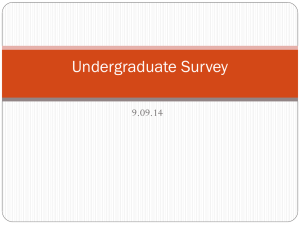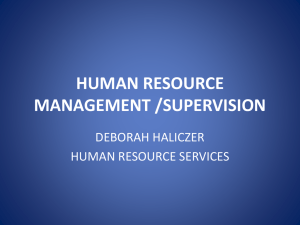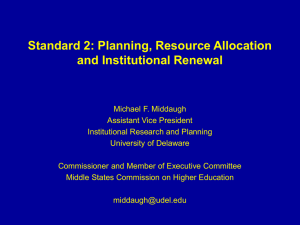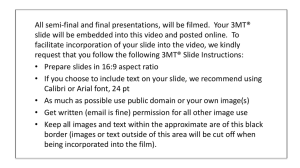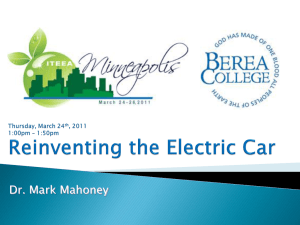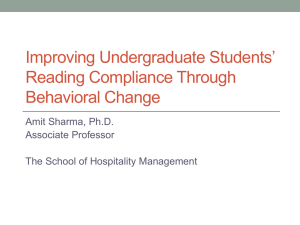GUIDELINES FOR IESL PARTIII (C) PROJECTS 25 April
advertisement
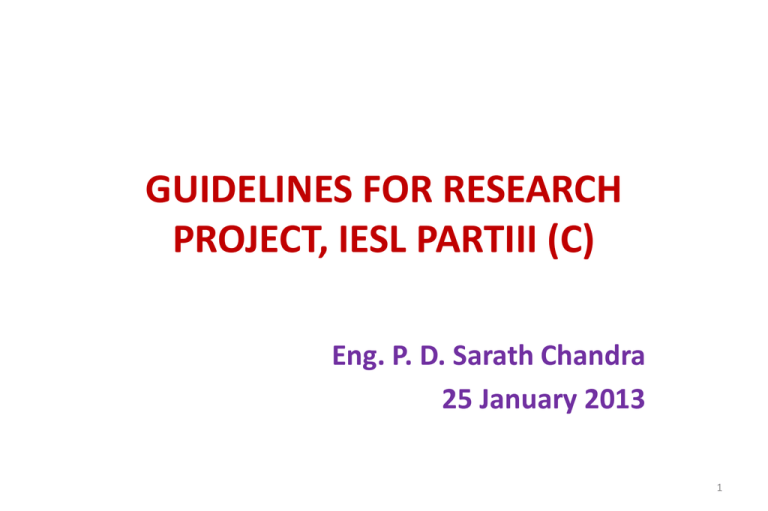
GUIDELINES FOR RESEARCH PROJECT, IESL PARTIII (C) Eng. P. D. Sarath Chandra 25 January 2013 1 PRESENTATION OUTLINE • • • • • • • • • What is Undergraduate Research? Standard Expected - IESL Part III (C), PROJECT Process in carrying out IESL Research Project Essential ingredients Good Practices to Develop What should you avoid? Role of your Supervisor Gains from Research Main activities of a Research 2 PRESENTATION OUTLINE • Benefits to you from doing research • Developing the Project Proposal • Ways to communicate Research 3 What is Undergraduate Research? Undergraduate research is: Mentored, Self-directed Work that enables individual students or small groups of students to explore an issue of interest to them, and communicate the results to others. There is often an immediate connection to a local, national, or international issue, and an increasing appreciation of the value of multidisciplinary approaches. 4 What does a Research Project Involve? A Research project involves: inquiry, design, design and development investigation, Mathematical modeling/analysis scholarship, discovery, invention, innovation application, Process and analyse data collection of Data communication of work Experimentation Hypothesis testing 5 INDIVIDUAL, OR GROUP PROJECTS ! As far as the IESL PART III (C) is concerned, an individual should undertake single project. However, a group project is possible whenever the scope of single project is too large, and if two or three persons, in a group, undertake as distinct parts of that project subject to individual evaluation. 6 STANDARD EXPECTED FOR IESL PARTIII (C) – EVALUATION OF PROJECTS The standard of IESL PART III (C), project, should be comparable with those of other four Engineering Faculties in the country. Therefore, the benchmark for IESL PART III (C), Research Project is the standard of those of undergraduates who complete projects as a partial fulfillment in B.Sc. Of Engineering or B.Tech. of Engineering degrees awarded by the relevant Universities 7 Does accomplishment of a Project involve a Process? YES ! It DOES Can you decide one of your own processes? It may be possible I will give you a typical flow chart that you may follow in achieving the success. 8 WHAT IS THE MOST ESSENTIAL INGREDIENTS OF AN UNDERGRADUATE RESEARCH PROJECT 1. Creating new knowledge 2. Surging new ideas 3. Bringing any innovations and inventions into limelight 4. Adding value to an existing piece of work 5. Exposing Research Findings 9 GOOD PRACTICES TO DEVELOP! • Have a plan, it may be a flexible one • Follow a process • Meet set timelines • If the available period prior to submission is six (06) months , have a time plan to adhere to • Have a daily record of the work related to your project, it may be useful as you progress with your work • Have a record of literature that you review • Search for information by going through different sources available • Discuss the work with your colleagues and superiors, and seek opinions • Remember that you need assistance from your collegues, subordinates and superiors in order to meet the target of success • Work with your supervisor in harmony 10 THINGS THAT YOU SHOULD AVOID FROM DOING , WHILE PERFORMING THE PROJECT! Plagiarism: This means, •Copying somebody else’s work and produce •Submit others work without acknowledgement •Directly copying from websites and publishing extracted materials without acknowledgement Copying and submitting the work of your organisation: This means, • Publishing work of the organisation as if you have done it • Submission without approval any data/drawing/ etc., of which your organisation has the ownership 11 ROLE OF YOUR SUPERVISOR • Help develop the Research Proposal • Provide Directions to achieve set targets • Make himself available for you to clear any doubts, and obtain any assistance when you cannot progress without additional knowledge which you do not possess. • Provide guidance at the time of report writing • Give you the moral support during the project period 12 Your Supervisor can be a person: • from a Faculty of Engineering, who is holding a position not less than a Senior Lecturer who is capable of advising you in the area to be studied, or • with status not less than a Corporate Member of the IESL, but competent to advise you in the subject area, in which you have chosen your project, or • Can be a Senior Manager/Engineer who is at least a Corporate Member of the IESL, and who is also competent to advise you about the subject matter related to the project, and • who is easily accessible to you to consult when you need academic assistance 13 CAUTION!!! • Your supervisor's role is not only signing the proposal and the final report for submission, but much more than that. • It is your responsibility to select the correct supervisor for the selected research area • Learn to manage the Supervisor for your advantage. 14 WHAT DO YOU GAIN FROM RESEARCH PROJECTS You will acquire practical tools for your education and future career through: •Critical thinking and analytical skills •Teamwork •Communication •Leadership •Global perspective •Preparation for lifelong learning •Learning to meet target days 15 WHAT DO YOU GAIN FROM RESEARCH PROJECTS • You will increase self-confidence in your abilities as a scholar and a researcher • You will better see the connections between various disciplines • You will learn to create knowledge by engaging in active learning • You will take research methods from the classroom and apply them to real-life situations • You will expose your hidden talents and steer your career towards a better direction. 16 WHAT SKILLS DO YOU DEVELOP FROM RESEARCH PROJECTS • New Laboratory and experimentation • Computer, computation, use application software • Collecting data and use of statistical tools to make decisions • Reading journal articles and doing literature searches/review • Communication – Writing report, making presentations of findings, presenting research papers in journals 17 What do Undergraduate Research look like? • Library searches and archive work • Surveys and interviews • Analysis • Laboratory bench work • Modeling Simulation and Computations • Fieldwork • Observations on incidence over time • Creative work design, and more 18 Why should you consider doing undergraduate research important? •By engaging in undergraduate research, you will learn to apply what you already know to new issues that interest you, and have the opportunity to influence others. 19 Why should you consider doing undergraduate research is important? •You may also create new works that are appreciated by the community and beyond, experience the joys of scholarship and the thrill of discovery, and you watch with pride as your ideas are adapted and implemented by others. 20 Why should you consider doing undergraduate research important? • Along the way, you are likely to develop new skills, meet others with similar interests, gain confidence, define your own style, deepen your connections to the society, and use your experiences to help you choose a future career path. 21 DEVELOPING A PROJECT PROPOSAL 1.Clear statement of the Research Question: State clearly what you will be studying. Be sure that this is understandable to someone who doesn’t know much about your field of study. If needed, define terms. To test your explanation – give this to a friend not in your major. If he/she doesn’t understand, try again! 22 Project Title • Should be decided after careful thoughts, and once the research problem is clear to you • Should be definite, concise (succinct), Note Key Words in the Title (ex. Design, Develop, Experimental study) • Should reflect a clear meaning of your work • Your work should be confined to the idea expressed by the title • Title should not project more than what is in the research • It should tempt the person to read the inside report who shows an interest on it 23 DEVELOPING A PROJECT PROPOSAL 2. Project Aims and Objectives – Aims and Objectives are often confused with each other. Aims generally cannot be easily measured because there is nothing specific to check if they have been met. The objectives set himself targets towards achieving that aim. Objectives has measures, because they involve specific dates or and figures etc. 24 Objectives Should be • Specific : what the student should be able to do/how they will do it, and to what level • Measurable: you should be able to work out how their attainment will be assessed • Attainable: by the student taking part in the Research • Realistic: “appropriateness” of the task (similar to attainable) • Time-appropriate: achievable within the length of the Research/Project Let us go through a simple example to understand what they are, 25 • Nimal wants to drive a car as his brother does. Nimal’s father set following targets for him to achieve: 1. He should pass his theory test by next March. 2. He should pass his practical driving test by next June. 3. He should save Rs.10,000 each month from his part-time job and from his pocket money towards the deposit for the car. 26 Outcomes of Research Projects Be definite about the Outcomes of your Research Work (For example:) • Achievement of Objectives • Submission of a good research report for evaluation • Make a presentation on the findings to a panel of examiners/audience • Defend the ideas/views and relevance of the work and success of the work before a panel • Make it a work of merit • Publish research papers if the research is a success 27 DEVELOPING A PROJECT PROPOSAL 6. Anticipated results/Final Products and Dissemination (Outcomes). Describe possible forms of the final product, e.g., publishable manuscript, conference papers, invention, software, exhibit, performance, etc. Be specific about how you intend to share your results or project with others. 28 Developing a Project Proposal • This section may also include an interpretation and explanation of results as related to your question • A discussion on or suggestions for further work that may help address the problem you are trying to solve • An analysis of the expected impact of the scholarly or creative work on the audience; or a discussion on any problems that could hinder your creative endeavor. 29 DEVELOPING A PROJECT PROPOSAL 3. Background/Statement of the Problem/Significance of the Project – Be succinct (definite and to the point). Clearly support your statement with documentation and references, and include a review of the literature that supports the need for your research or creative endeavor. A discussion of present understanding and/or state of knowledge concerning the question/problem or a discussion of the context of the scholarly or creative work. 30 Developing a Project Proposal • This section (Background /Statement) presents the problem you intend to solve and your solution to that problem. • What is the question that you want to explore in your research and why is this an interesting and important question? • In thinking about the significance, try to take the position of an educated newspaper reader. If she or he were to see an article about your research in the paper, how would you explain the importance of your project? • For most proposals, this section will have references. • This section should also include how your project benefits or impacts to the society as a whole and what knowledge is gained by you or disseminate to others. 31 DEVELOPING A PROJECT PROPOSAL 4. Experimental/Project Design – Design and describe a work plan. This may include use of population samples, experimental and control groups, or other methods of data gathering and statistical analysis. The work plan may include archival research, translating, fieldwork, laboratory experiments, or other forms of analysis and synthesis of ideas and concepts. This section of the proposal should explain the details of the proposed plan. How will you go about exploring your research question? What will be your methods? If you are not the only person working on the project, who else will be involved? Be specific on what you will be doing. The reasoning behind the research opportunity is to make sure that you have a clear idea about the problem. If the reviewer can’t tell what part of a project you will be doing, he/she can’t evaluate your experience. 32 DEVELOPING A PROJECT PROPOSAL 5. Project timeline – Give an overview of when you are going to do specific steps of your project. This does not need to be a day to day list but depending on the length of your project it may give an overview biweekly or monthly. Be sure to include time to review/synthesize your data or to reflect on the experience. You should include time to write the final report/paper. 33 Method to Present Time plan DEVELOPING A PROJECT PROPOSAL 7. Student's personal statement – This section is read carefully by the reviewers and does impact their decision. You may wish to include why you want to do this project, what got you interested in it, your career goals, and how this award would further those goals. While it is important, please remember that it shouldn’t overpower the rest of the proposal. One quarter to one-half of the page should be sufficient. 35 6. Project References • Use the standard convention the author, title of article, journal title, volume, pages, and date. • Refer to Harvard Reference formats or/and Harvard Style Reference Generator to learn the referencing methods in detail 36 Phases in Research Project 1. Receiving approval from the IESL 2. Further literature survey to collect information, process information 3. Develop alternative solutions to the research problem 4. Mathematically model the solutions (Note the assumptions made to simplify the problem) or experimentation/laboratory work/field work 5. Analyse the models using mathematical tools or software/Collect data from experimentation and analyse 6. Work for obtaining the optimum solution 37 Phases in Research Project 7. Validate the model 8. Make improvements to the model if the results are not acceptable 9. Repeat experiments or outputs from final model, collect data 10.Analyse data 11.Make conclusions 12.Design/Develop prototype or scale model 13.Research communication (Report) 38 Phases in Research Projects 14. Obtain approval from the Supervisor for report 15. Submission 16. Examination 39 COMMUNICATION OF RESEARCH 1. Your research is of no use if you are not in a position to communicate to others. 2. One of the outcomes of the Part III (C) is developing communication skills 3. There is a considerable weightage to measure the communication skills. 4. Both verbal and written communication are equally important. 40 WITH WHOM YOU COMMUNICATE YOUR WORK AND FINDINGS • With the IESL for the purpose of evaluating your project – In the form of a written report • AN EXCLUSIVE AUDIENCE WITH A PRESENTATION using multimedia equipment and material prepared with Microsoft Power Point Software 41 DEVELOPING REPORT WRITING SKILLS IS ANOTHER OUTCOME OF A PROJECT • Learning to prepare a formal report • Follow standard report writing format (top, bottom, right and left margins, font sizes, cover page, paragraphing, line spacing, etc.) • Communicating clearly, precisely; presenting facts grammatically accurate, using punctuation marks relevantly, adhering to economical writing, using available technology to enhance the quality of texts, drawings, graphs, photos, etc. 42 Good Practice: Browse through a Well Written Project Reports with an Open Mind • Search in the library for well written reports. • Browse them to learn the report writing format • If you find any drawbacks there, you must improve them in your report and avoid following any form of unacceptable presentations • Read at least one text book on “Report Writing” to learn good practices CAUTION !!! DO NOT FOLLOW POORLY PRESENTED AND SUB-STANDARD REPORTS. 43 PRESENT TO AN AUDIENCE USING AUDIO VISUAL EQUIPMENT • Learn to handle and use audio video equipment in presentation to an audience. • Develop good habits when making presentations • Learn essential tips from making slides to starting to finishing points of your presentation to an audience • This includes how you speak to the audience, getting the attention of the audience, convincing the audience with specific facts, synchronising your talking with the slide show, your posture, etc. 44 Writing Proposal Structure of a thesis proposal.docx 45 THANK YOU 46

